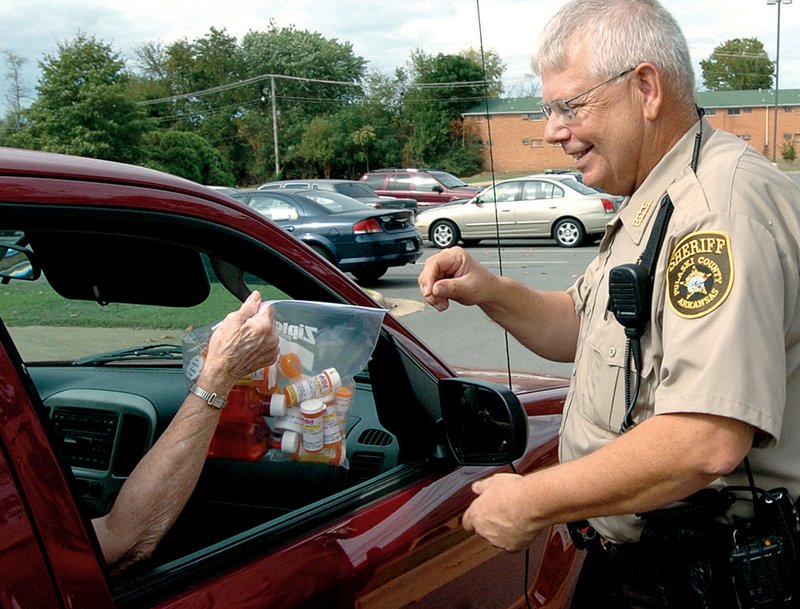LITTLE ROCK — Charles Cunningham had a bagful of prescription medication left after his elderly mother died in May.
He considered taking the pills to the Little Rock-area hospital where he works to dispose of them but never got around to it. One thing was certain: He knew he couldn’t in good conscience just throw the pills in the trash.
So on Saturday, Cunningham was one of tens of thousands of people around the state and nation to take advantage of drug take-back programs aimed at getting old prescription medication out of homes and off the streets.
“You don’t put stuff like this in the trash,” Cunningham, 65, said Saturday at the drop-off site at the Pulaski County jail. “Somebody can get their hands on them, kids or anybody, and overdose.”
The Drug Enforcement Administration teamed with local and state law enforcement to sponsor the event, where residents could drive up and leave their old medications to be incinerated later.
Fran Flener, Arkansas’ governor-appointed drug czar, said there were 201 sites statewide. A DEA spokesman said there were approximately 4,200 drop-off sites spread among all 50 states. About 3,000 law-enforcement agencies participated, he said, and each site was manned by authorities from those agencies and volunteers.
“Our goal [in Arkansas] was to take back 1 million pills in one day and I’m pretty sure we will easily achieve that goal,” Flener said. “We won’t know a final count until probably Tuesday, that’s when the big collection will be; Tuesday and Wednesday. The pills will be incinerated on Thursday.”
Other sites were in Bella Vista, Brinkley, Helena-West Helena, Warren and Pine Bluff.
Flener said prescription drug abuse is “one of the fastest-growing drug problems in the nation.”
Flener noted that a 2008 study - the Arkansas Prevention Needs Assessment - of high school students found that about 22 percent of students had abused prescription drugs by their senior year. She said that between 2003 and 2007, there were 15 overdose deaths among Arkansans between ages 12 and 17.
“That number does not include those who died from accidents caused by overdoses, like car wrecks or falling off a bluff,” Flener said. “We want to educate.”
Sgt. Cassandra Davis, a spokesman for the Little Rock Police Department, was visiting the county jail location. She said that even expired drugs cause problems.
“Even though the drugs may be expired, they may still have an effect. When you’re intermingling pills, you don’t know how they will interact with each other,” Davis said. “This is a way for people to dispose of their old drugs in an environmentally safe way and to keep the drugs from falling into the wronghands.”
The Environmental Protection Agency supported the drug disposal program. The environmental regulator has been studying the potential effects of pharmaceuticals and personal care products in the nation’s waterways.
“Studies have shown that pharmaceuticals are present in some of our nation’s water bodies. Further research suggests that there may be some ecological harm when certain drugs are present. To date, no evidence has been found of human health effects,” the agency states on its website, epa.gov.
The number of such contaminants found in the water is growing, the agency notes, stating that in addition to antibiotics and steroids, more than 100 types of pharmaceuticals or personal-care products have been identified in environmental samples and drinking water as of 2007.
Flener said Saturday was the first time that Arkansas has participated in such a large-scale effort. However, she said law-enforcement agencies around the state have been holding such programs for their communities over the past few years.
She said her goal is to have at least one drop-off box for prescription drugs at a law enforcement site in each of the state’s 75 counties.
“We’re exactly where we once were with seat belts and child-restraints usage,” Flener said. “Today, it’s just very natural that when you get into an automobile and put the key in the ignition, you reach over, grab your seat belt and buckle it. It’s natural now, but was not 20 years ago. We want to teach people to treat prescription drugs just like they would a loaded weapon or fine jewelry: Lock it up or dispose of it properly.”
Arkansas, Pages 15 on 09/26/2010
